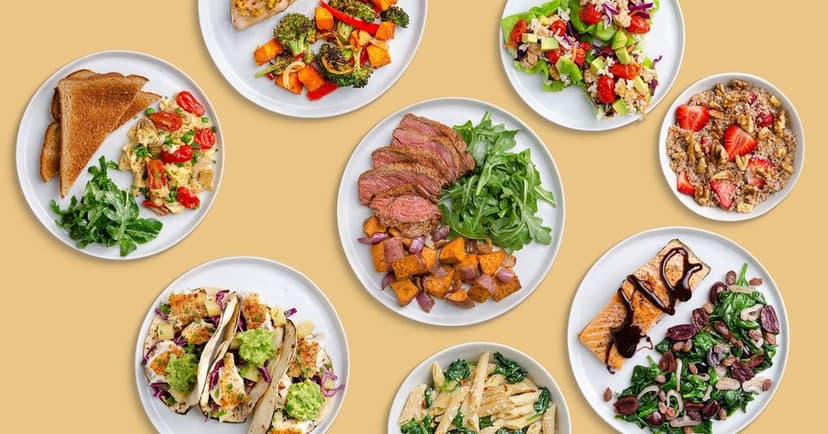Creating a meal plan can seem tough, but it's a great way to eat healthier and save money. By starting small and building up, anyone can make meal planning a part of their routine. This guide will help you understand the basics of meal planning, from picking recipes to organizing your kitchen and adjusting plans to fit your lifestyle.
Key Takeaways
- Start with a few simple meals and gradually add more as you get comfortable.
- Make sure to include a variety of food groups in your meal plan for balanced nutrition.
- Organize your kitchen with the right tools and a functional layout to make meal prep easier.
- Use batch cooking and time-saving techniques to streamline your meal prep process.
- Customize your meal plans to fit your dietary needs and lifestyle, and don't hesitate to seek professional guidance if needed.
Starting Small: Building a Sustainable Meal Planning Habit
Begin with a Few Meals
When you're new to meal planning, it's best to start with just a few meals or snacks for the week. This approach helps you avoid feeling overwhelmed and allows you to gradually get used to the process. Over time, you'll discover which strategies work best for you, and you can slowly add more meals to your plan.
Gradually Increase Complexity
As you become more comfortable with meal planning, you can start to include more complex recipes and a wider variety of meals. This gradual increase in complexity ensures that you don't get discouraged and gives you the chance to build your skills and confidence.
Find Your Rhythm
Everyone's schedule and preferences are different, so it's important to find a meal planning rhythm that works for you. Whether you prefer planning meals weekly, bi-weekly, or monthly, the key is to be consistent. Set aside a specific time each week to plan your meals, and stick to it. This consistency will help make meal planning a natural part of your routine.
Remember, the goal is to create a sustainable habit that fits into your lifestyle. Start small, be patient with yourself, and enjoy the process of discovering new recipes and flavors.
Incorporating All Food Groups for Balanced Nutrition
Importance of Diverse Food Groups
Eating a variety of foods is key to getting all the nutrients your body needs. Each food group offers different essential nutrients that help keep you healthy. For example, fruits and vegetables provide vitamins and minerals, while grains offer energy through carbohydrates.
Selecting Nutritious Recipes
When picking recipes, aim for those that include multiple food groups. This ensures a balanced intake of nutrients. You can start by including fruits, vegetables, grains, protein foods, and dairy in your meals.
Filling Nutritional Gaps
Sometimes, your diet might lack certain nutrients. To fill these gaps, consider adding foods rich in the missing nutrients. For instance, if you need more calcium, include more dairy or fortified alternatives in your diet.
A balanced diet is not just about eating enough but eating right. Make sure to include a variety of foods to cover all your nutritional bases.
Organizing Your Kitchen for Meal Planning Success
Essential Tools and Equipment
You don’t need to overhaul your entire kitchen to begin meal planning. All you need are a few tools to help you stay organized:
- Quality storage containers: Invest in a variety of sizes to store different types of food.
- Sharp knives: A good set of knives makes chopping and prepping much easier.
- Cutting boards: Have separate boards for meat and vegetables to avoid cross-contamination.
- Measuring cups and spoons: Accurate measurements are key to following recipes correctly.
- Slow cooker or Instant Pot: These can save you a lot of time on busy days.
Creating a Functional Space
Good organization is a key component to any successful meal plan. An organized kitchen, pantry, and refrigerator make everything from menu creation, grocery shopping, and meal prep a breeze, as you’ll know exactly what you have on hand and where your tools and ingredients are. There’s no right or wrong way to organize your meal prep spaces. Just make sure it’s a system that works for you.
Maintaining Organization
Consistently make time to tidy up your kitchen. This includes cleaning out the fridge, organizing the pantry, and ensuring all tools are in their proper place. A clean and organized kitchen makes meal planning less stressful and more enjoyable.
Keeping your kitchen organized is an ongoing process. Regularly check your inventory and adjust your system as needed to keep things running smoothly.
Effective Strategies for Meal Preparation
Batch Cooking Techniques
Batch cooking is a game-changer for anyone looking to save time and effort in the kitchen. By preparing large quantities of food at once, you can have meals ready for the entire week. This method not only saves time but also ensures you always have a healthy meal on hand. Start by selecting a few recipes that can be easily scaled up. Cook these recipes in bulk and store them in portion-sized containers.
Time-Saving Tips
Efficiency is key when it comes to meal preparation. Here are some time-saving tips to help you get started:
- Plan your meals: Knowing what you will cook in advance can save you a lot of time.
- Prep ingredients ahead of time: Chop vegetables, marinate meats, and measure out spices before you start cooking.
- Use kitchen gadgets: Tools like slow cookers, instant pots, and food processors can significantly cut down on prep time.
Storage Solutions
Proper storage is essential for keeping your meals fresh and tasty. Invest in quality storage containers that are both airtight and leak-proof. Label each container with the date and contents to keep track of what you have. Freezing meals in individual portions can also be a great way to extend their shelf life.
Meal preparation doesn't have to be a daunting task. With the right strategies, you can make it an enjoyable and efficient part of your routine.
Customizing Meal Plans to Fit Your Lifestyle
Adapting to Dietary Needs
Everyone has unique dietary needs, whether it's due to health conditions, fitness goals, or personal preferences. Tailoring your meal plan to meet these needs is crucial for long-term success. For instance, athletes might focus on protein-rich meals, while someone managing diabetes may prioritize low-carb options.
Family-Friendly Options
Creating a meal plan that suits the entire family can be challenging but rewarding. One strategy is to keep the main dish consistent and offer customizable sides. For example, on taco night, provide different types of tortillas and separate toppings like avocado and onions. This way, each family member can tailor their meal to their liking.
Adjusting for Special Occasions
Special occasions often call for a break from the usual meal plan. Whether it's a holiday feast or a birthday celebration, it's important to allow flexibility. Plan ahead by incorporating these events into your meal plan, so you can enjoy without guilt. Remember, balance is key, and occasional indulgences are part of a healthy lifestyle.
Flexibility in your meal plan allows you to enjoy life's special moments without feeling restricted. Balance and moderation are essential for long-term success.
Leveraging Professional Guidance and Resources
Consulting a dietitian can be a game-changer for your meal planning journey. Dietitians are trained experts who can provide personalized advice based on your health needs and goals. They can help you understand nutritional labels, suggest meal ideas, and ensure you're getting a balanced diet. You can find a registered dietitian through the Academy of Nutrition and Dietetics' directory.
Meal planning apps can simplify the process of organizing your meals. These apps often come with features like recipe suggestions, grocery lists, and nutritional information. Some popular meal planning apps include:
- MyFitnessPal: Tracks your food intake and exercise.
- Yummly: Offers personalized recipe recommendations.
- Mealime: Helps you create meal plans and shopping lists.
There are many educational resources available to help you with meal planning. Websites like eatright.org offer articles, tips, and tools to guide you. Books and online courses can also provide in-depth knowledge on nutrition and meal planning. Staying informed can empower you to make better food choices and maintain a healthy lifestyle.
Remember, leveraging professional guidance and resources can make your meal planning more effective and enjoyable. Don't hesitate to seek help and use the tools available to you.
Evaluating and Adjusting Your Meal Plan
Tracking Progress
To ensure your meal plan is effective, it's important to track your progress. Keep a journal or use an app to note what meals you enjoyed, what worked well, and what didn't. This will help you identify patterns and make informed adjustments.
Making Necessary Adjustments
Don't be afraid to tweak your meal plan as needed. If a particular recipe isn't working out, swap it for something else. Flexibility is key to maintaining a sustainable meal plan.
Staying Flexible
Life is unpredictable, and your meal plan should be able to adapt. Whether it's a sudden change in schedule or an unexpected event, being flexible will help you stay on track without feeling stressed.
Remember, the goal of a meal plan is to make your life easier, not harder. Adjust as needed to fit your lifestyle and preferences.
Conclusion
Designing a successful meal plan doesn't have to be complicated. By starting small, staying organized, and considering all food groups, you can create a plan that works for you and your family. Remember, it's okay to make adjustments as you go along. The key is to find a system that fits your lifestyle and stick with it. With these tips and strategies, you'll be well on your way to enjoying nutritious and delicious meals every day. Happy planning!
Frequently Asked Questions
How do I start meal planning if I've never done it before?
Start small by planning just a few meals for the week. As you get more comfortable, you can gradually add more meals to your plan.
Why is it important to include all food groups in my meal plan?
Including all food groups ensures you get a balanced diet with all the necessary nutrients your body needs to stay healthy.
What are some essential tools for meal planning?
Some essential tools include a good set of knives, cutting boards, storage containers, and a planner or app to organize your meals.
How can I save time during meal preparation?
Batch cooking and prepping ingredients in advance can save you a lot of time. You can also use time-saving appliances like slow cookers or instant pots.
Can I customize meal plans for my dietary needs?
Yes, you can adapt meal plans to fit your dietary needs, whether you're vegetarian, gluten-free, or have other dietary restrictions.
Is it helpful to consult a dietitian for meal planning?
Consulting a dietitian can provide personalized advice and help you create a meal plan that meets your specific health goals and dietary needs.
























